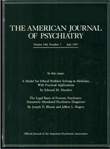Response to antipsychotic medication: the doctor's and the consumer's view
Abstract
The subjective response to antipsychotic medication was systematically evaluated in two samples of schizophrenic patients, one treated with haloperidol, the other with thiothixene. For both groups, a dysphoric response to the first dose was found to be a powerful predictor of noncompliance. A persisting dysphoric response was associated with a poor clinical outcome. Dysphoric responses were powerfully associated with akathisia. Patients' subjective responses were consistent throughout therapy, and there was moderate agreement between the patients' evaluation of the medication and the staff's ratings of improvement. The authors suggest that the subjective response to antipsychotic medication should not be dismissed and that dysphoric responses should be acknowledged.
Access content
To read the fulltext, please use one of the options below to sign in or purchase access.- Personal login
- Institutional Login
- Sign in via OpenAthens
- Register for access
-
Please login/register if you wish to pair your device and check access availability.
Not a subscriber?
PsychiatryOnline subscription options offer access to the DSM-5 library, books, journals, CME, and patient resources. This all-in-one virtual library provides psychiatrists and mental health professionals with key resources for diagnosis, treatment, research, and professional development.
Need more help? PsychiatryOnline Customer Service may be reached by emailing [email protected] or by calling 800-368-5777 (in the U.S.) or 703-907-7322 (outside the U.S.).



